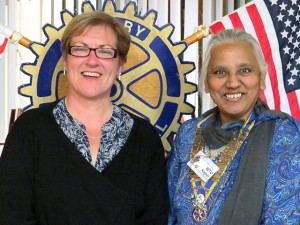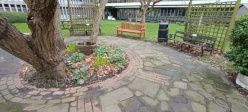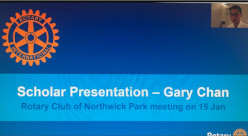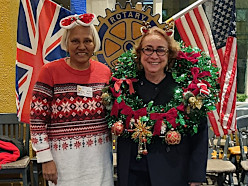The Untold D Day Story– Sidney Goldberg Speaker- Rachelle Goldberg 21.08.24
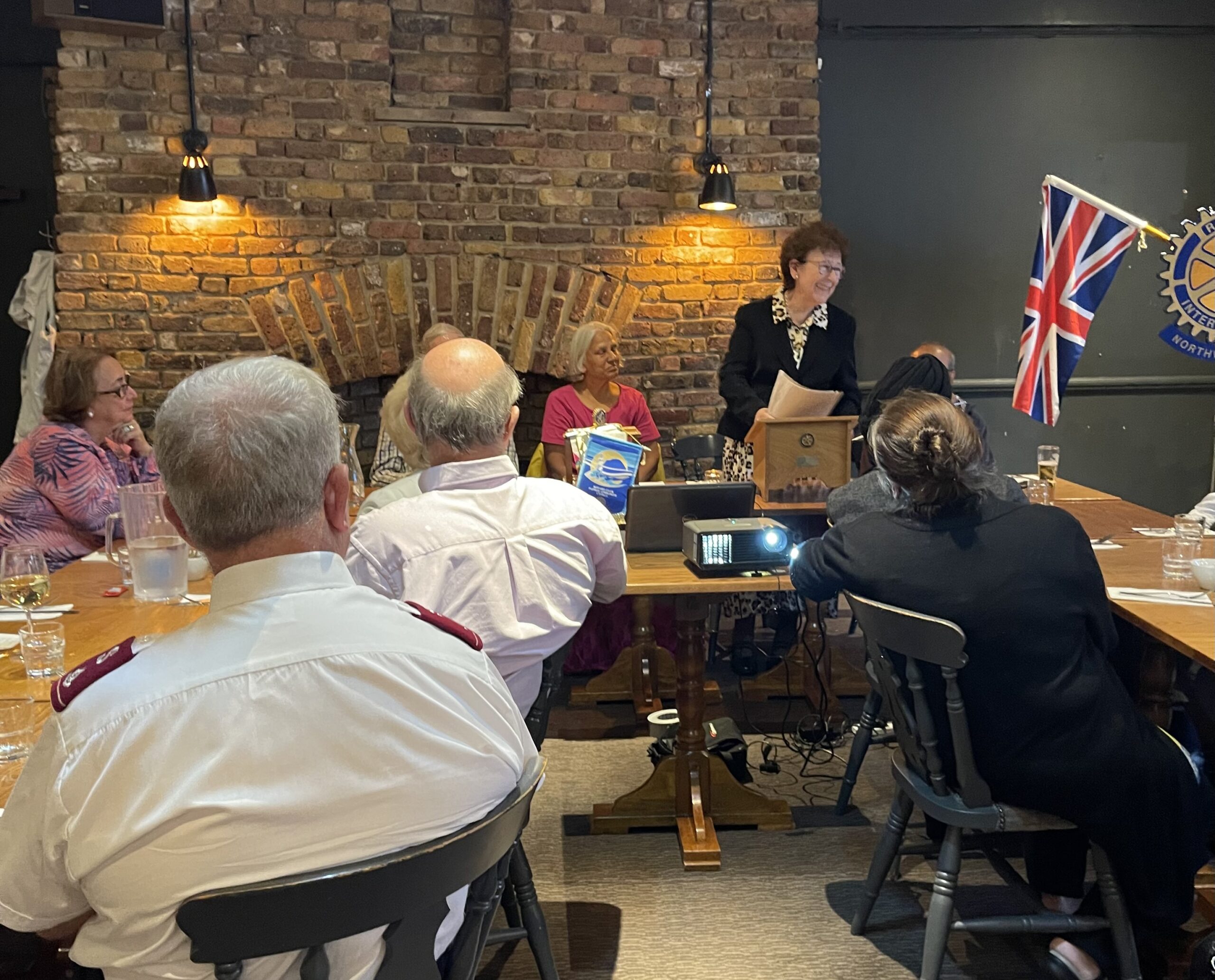
Rochelle’s father took part in the D-Day landings in June 1944. Her talk was a perspective of his achievements with his unit and his War Service.
Sidney was born in Leipzig in Germany, and brought to London in 1933. In 1941, aged 18 he was rejected to be an RAF pilot because of his eye sight But being fluent in German, was moved to RAF Combined Operations Y Service NO 381 Wireless Unit Air Signals intelligence, His role was to intercept enemy signals with radar information. This was a fifty strong unit with 3/4 linguists.
He trained at an RAF station in Hampstead, and served at numerous operational Bomber Stations. He saw service in Operation Torch and Husky, Sicily and Tunisia. Between 1942/3 Arriving at Bone in Algeria his reports were passed to Air headquarters contributing to many successful engagements by Allied fighters. In Tunisia high in the Medjerda Mountains near the airfield complex at Souk el Arba the risk was severe. These operations prepared the ground for Operation Overlord, Normandy Landings. Around 3,500 messages were intercepted between February and May of that year. Following the fall of Tunis, his unit moved to Cap Bon to cover the invasion of Sicily, later returning to England to prepare for D Day On June 5th he embarked on HMS Hilary the Headquarters ship for Force J (Juno) to cover the 3rd Canadian Infantry Division landings He was the only RAF representative on board the Headquarters Landing Ships on D Day also being transferred to HMS Rodney on the 7th. He was mentioned in dispatches but not by name because of secrecy He landed at Arromanches on August 8th and his unit moved eastwards with the frontline ground forces as they advanced into Holland where support was given for the airborne landings at Arnhem, and liberating Brussels.
He was transferred to HMS Hilary Headquarters Ship for the 3rd Battalion Canadian troops on June 5th. He witnessed the invasion six to seven nautical miles from the coast. He recalled the continuous flow of troops streaming inland and that the whole of the foreshore looked like a sea of mud with tyre marks from amphibious vehicles.
Sidney put veterans at the forefront of successive Governments, getting them and the National lottery to pay for them to return to France, He supported Veteran care, and gave talks to schools for students to benefit from learning about the Landings
He joined the Normandy veterans in 1990. There were 150 branches with 20,000 members. He became Chairman of a Branch and the National Public Relations Officer, and published a monthly booklet on Branch activities.
1992 was a key year. The Government were unpopular, and Iain Sproat MP, the National Heritage Minister announced the use of public commemorations to boost domestic support. This hijacked events organised by the Normandy Veterans Association. The BBC phoned National Public Relations Officer, Sidney, asking for the Normandy Veterans thoughts. This BBC TV interview put the Normandy Veterans Association in the public domain. Sidney became a media celebrity, receiving calls for interviews from all over the world and all UK media He was asked to review the papers and got Veterans to tell their D-D experiences
At the time Sidney was also concerned at the lack of preparation by the Government to recognize the 50th Anniversary in 1994. Rachelle, was on Rhodes Boyson’s canvassing Team, and spoke to him about it, He contacted Sidney. The Normandy Veterans Council were invited to the Ministry of Defence to put their case. In 1994 the Queen took part and also members of the Government and there was full coverage on TV, Radio and in the Press.
In 2002, Sidney, in an article said that America, Canada and France would be contributing to the Commemorations in 2004 and that as regards the UK a single Government Minister would be attending also with Senior Military Officers and a band from the Parachute Regiment. We have a Government who doesn’t seem comfortable with its traditional history. The British Government is ashamed of its military triumphs and indifference to men who survived. The Normandy Veterans Association, had a battle again with the Government to recognise the importance of attending commemorative events in Normandy for the 60th Anniversary.
In a Guardian interview, March 2004, Sidney said “Until 1984 the Commemorations were virtually disregarded by the public. Now in 2004 it has assumed a great importance than any other. There is a far greater attempt to transfer the information to other people. We return to remember our comrades who didn’t make it and give thanks for our own lives. I’m not a tearful man but I have a moment of reflection. It’s a job we had to do and we got on with it. (He added the German Chancellor Gerhardt Schroder had been invited by the French Government.) Some of our veterans have very bitter memories of Normandy. They were up against the Waffen SS who committed numerous atrocities. German veterans would not be welcome”
Sidney attended and helped to organise the 50th and 60th high profile events and in 2004 was the Technical Director to the BBC for their coverage of the International Commemorative event. In June 2004 he was awarded the Chevalier legion D’Honneur by the French Government.
Sidney died in 2011, and to commemorate his service, Rochelle set up a National Schools Competition. It launched October 2013 at the Speakers’ House at Westminster and in spring 2014 received eighty entries. Rachelle accompanied a winner on a three day study tour of the 5 Beach Areas covering 56 miles.
In 2014 The Normandy Veterans Association in Uxbridge invited her to join them for the 70th Anniversary having an official send off from the Mayor and Mayoress of Hillingdon, and attended three international events which included the Royal Box on the beach at Arromanches.
Later that year all the Normandy Veteran Branches closed.
This year the Royal British Legion announced that Normandy Veteran’s descendents could apply for a ticket and one guest to attend a Commemorative Service at Bayeux Commonwealth War Graves, The proviso was a 100 word statement on why one wanted to be there. Rochelle received ticket one. The Princess Royal, with 800 attendees included 30 veterans, UK Government officials, France and Canada. attended. Rachelle also attended the D-day Beacon lighting at JFS. A very special occasion with students from the CCF and JCOS.


